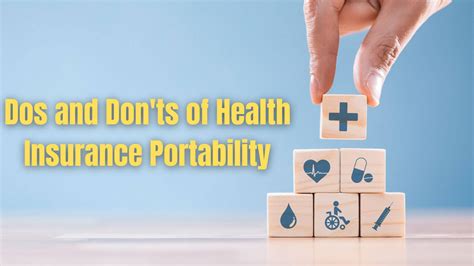Switching jobs is exciting, a chance for growth, new challenges, and maybe even better benefits. But amidst the thrill, it’s easy to overlook a crucial aspect: your insurance. Did you know that changing jobs can significantly impact your coverage?
Are you wondering how COBRA works, if you’ll lose your existing plan, or how to navigate the complexities of transitioning healthcare, life, and disability insurance?
Don’t worry, you’re not alone. Many job changers face confusion and uncertainty about their insurance rights and options.
In this article, we’ll unveil five sneaky ways your job change can affect your insurance portability, empowering you to make informed decisions and protect yourself financially.
Let’s dive into the details and ensure a smooth transition for you.
5 Sneaky Ways Your Job Change Affects Your Insurance Portability

1. Health Insurance: More Than Just a Monthly Premium

Switching jobs? Congratulations! This exciting new chapter often comes bundled with a healthy dose of administrative tasks, from updating your tax withholdings to transferring 401(k) plans. But nestled amongst these obvious changes lies a potentially tricky hurdle: navigating insurance portability.
Health insurance is often the big kahuna in this department. It’s not just about the monthly premiums; it’s about maintaining coverage, avoiding gaps, and understanding your newfound options. A seemingly minor switch in employment status can trigger some surprising consequences, impacting everything from coverage levels to pre-existing conditions.
2. COBRA: Your Continuation Lifeline, but Not Without Catch

Most employees leaving traditional jobs are likely familiar with COBRA, that acronym representing your right to continue employer-sponsored health insurance, albeit at your own expense.
But COBRA comes with caveats:
-
Costly Continuation: Monthly premiums, while covering your needs, often soar, sometimes doubling or even tripling.
-
Limited Duration: COBRA is temporary, usually lasting 18 months (though exceptions apply for specific qualifying events).
-
Eligibility Restrictions: Certain situations, like voluntary quitting, might make you ineligible for COBRA coverage.
3. HIPAA’s Role: Protecting Your Privacy, Not Your Coverage

While HIPAA prioritizes protecting your medical records confidentiality, it doesn’t guarantee seamless insurance transition.
Think of HIPAA as the backstage crew ensuring secure record transfer between healthcare providers and insurers. They ensure your pre-existing conditions remain documented but don’t directly influence whether your coverage transitions smoothly.
4. New Job, New Options: Explore Your Employer-Sponsored Plan

Your shiny new employer probably offers its own health insurance program. Before rejecting it outright, carefully compare plans.
- Benefits Package:
Don’t just glance at premiums! Analyze deductibles, copays, out-of-pocket maximums, and covered medical services. Compare them to your existing coverage, considering your personal healthcare needs.
-
Network Limitations: Understand which doctors, hospitals, and specialists participate in the new network. Switching jobs could mean needing to find new healthcare providers, potentially impacting comfort levels and familiar relationships.
-
Open Enrollment Windows: Most employer plans operate on fixed enrollment periods, usually tied to annual benefits review. Missing an enrollment window means waiting until next year to access coverage.
5. The “Gap” Threat: Bridging Coverage Transitions Strategically

A gap in health insurance can be financially precarious.
- Individual Marketplace: Consider exploring plans within the Affordable Care Act marketplace during open enrollment. Subsidies and tax credits may be available depending on your income.
- Short-Term Health Insurance:
These plans often offer temporary coverage, but bear in mind:
-
They typically lack essential health benefits mandated by ACA plans.
-
Coverage exclusions often apply pre-existing conditions.
Navigating the Maze: Tips for Stress-Free Transition

Remember, insurance doesn’t become less important with a job switch.
-
Initiate Early Dialogue: Talk to HR at BOTH your current and future employers weeks before your last day. Don’t underestimate the value of early communication in understanding your options.
-
Analyze Your Needs: Assess your existing coverage, personal healthcare requirements, and budget to determine the optimal insurance strategy for your situation.
-
Seek Professional Guidance: If navigating insurance nuances feels overwhelming, consult a qualified insurance broker. Their expertise can save you significant headaches and potentially financial burdens down the road.
Let’s Make Your Job Transition Smooth: A Final Word While changing jobs presents exciting prospects, remember your insurance coverage matters. Armed with knowledge, you can confidently transition to your next chapter, leaving insurance worries behind.
FAQ
Q: Does changing jobs automatically transfer my existing insurance coverage? A: No, changing jobs doesn’t automatically transfer your existing insurance coverage.
Q: What happens to my health insurance when I switch jobs? A: Your existing health insurance policy typically ends when you leave your current employer.
Q: Can I continue my current health insurance after leaving my job? A: You may be eligible to continue your employer-sponsored health insurance through COBRA, but it’s usually more expensive.
Q: What is COBRA and how does it work? A: COBRA allows you to temporarily continue your employer-sponsored health insurance coverage, but you’ll pay the full premium, including the employer’s share.
Q: Are there alternatives to COBRA? A: Yes, you can explore options like:
- Marketplace plans: These plans are offered through the Affordable Care Act (ACA) and may qualify you for subsidies.
- Medicaid: Depending on your income, you may qualify for Medicaid.
- Spouse’s insurance: If your spouse has employer-sponsored insurance, you may be eligible to join their plan.
Q: Does changing jobs affect my life insurance policy? A: It depends on the type of policy.
- Employer-sponsored life insurance: Coverage typically ends when you leave your job.
- Individual life insurance: Your policy remains in effect unless you choose to cancel it.
Q: What about disability insurance? A: Similar to life insurance, employer-sponsored disability insurance usually ends when you leave your job. Individual disability insurance remains active unless canceled.
Q: Should I contact my insurance providers before changing jobs? A: Yes, it’s crucial to contact your insurance providers well in advance of your job change to understand your options and avoid coverage gaps.




